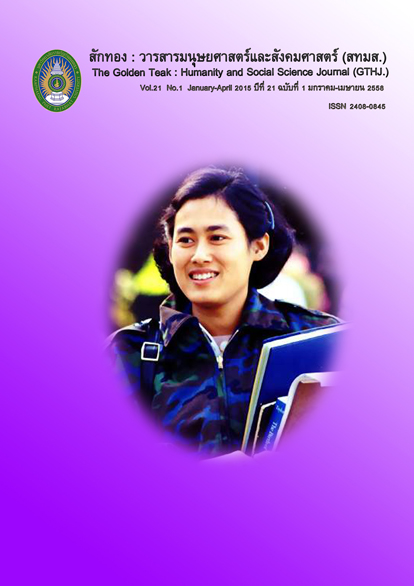The Development of English for Social Sciences Curriculum Using Experiential Learning with e-Learning to Enhance Students’ Paragraph Writing Ability, Analytical Thinking Ability and Moral Awareness of University Students
Main Article Content
Abstract
The purposes of this research are to develop the English for Social Sciences curriculum using Experiential learning with e-learning to enhance students’ paragraph writing ability, analytical thinking ability and moral awareness after the implementation. The population comprises 88 students enrolled in the English for Social Sciences course in the second semester of the 2013 academic year at Maejo University – Phrae campus. The research instruments are classified into 3 groups: 1) curriculum development instruments consist of need analysis and proto syllabus; 2) experiment instruments consist of lesson plans, a curriculum evaluation form for the experts and for the students; 3) the instruments used for data collecting consist of the paragraph writing ability tests, the analytical thinking ability tests, and the students’ moral awareness assessment. The obtained data were analyzed by using percentage, mean, standard deviation, and content analysis. The results of the study revealed that the English for Social Science curriculum was very effective and appropriate. Students’ paragraph writing ability after learning the implementation was at a competent level and met the set criterion at 50 percent. Students’ analytical thinking ability was at a competent level and the students had a high level of moral awareness
Article Details
Section
-
บทความที่ได้รับการตีพิมพ์เป็นลิขสิทธิ์ของวารสาร สักทอง : วารสารมนุษยศาสตร์และสังคมศาสตร์ สถาบันวิจัยและพัฒนา มหาวิทยาลับราชภัฏกำแพงเพชร
ข้อคิดเห็นใดๆ ที่ปรากฎในวารสารเป็นวรรณกรรมของผู้เขียนโดยเฉพาะ ซึ่งมหาวิทยาลัยราชภัฏกำแพงเพชรและบรรณาธิการไม่จำเป็นต้องเห็นด้วย


